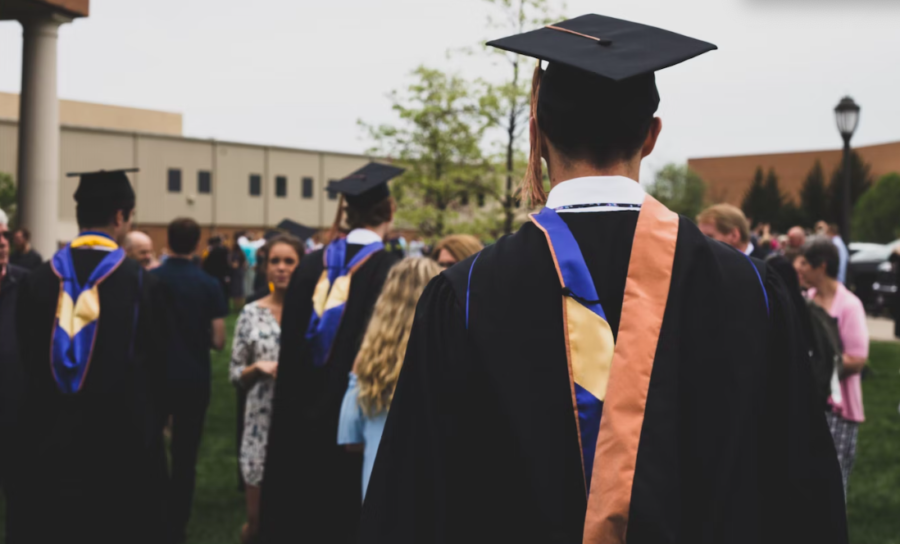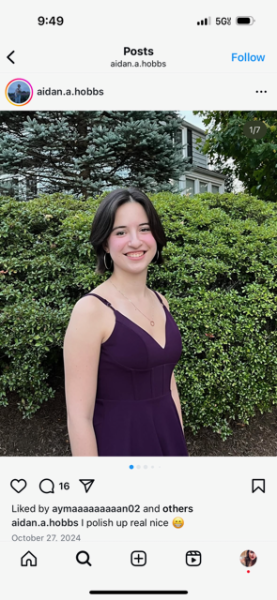Advice From Seniors on College Applications
Given a grade of A+ overall and ranked #9 out of 322 in Best College Prep High Schools in Virginia by niche.com, the school prepares students for college through counselor meetings, alumni chats and virtual tours with college representatives. Still, seniors have unique advice garnered through their experiences on what they did in the college application process, their regrets, and where they are now.
SAT/ACT
After COVID-19, 900+ colleges and universities have gone test-optional, meaning that applicants can choose whether or not to submit their test scores. Nevertheless, something students should do before applying to colleges is testing. The most popular options are the Scholastic Assessment Test (SAT) and the American College Test (ACT). 1.7 million high school students in the class of 2022 took the SAT at least once, and nearly 1.35 million students took the ACT, according to the US News. One way to choose which test to take is to consider that the ACT has a science section combining reading comprehension with data interpretation. Another difference is that the ACT has less time for each question; however, the reading and writing section questions can be more straightforward.
“Kaplan, the parent company of the ACT, has this really helpful feature on their website: you can sign up and it will send you an ACT question a day to practice,” senior Lauren Rylander said. “I did that for a couple months and I found it really helpful just because I could acclimate to how they ask questions and what type of questions they would be asking.”
Rylander also took practice tests for the ACT once a month from Khan Academy. While Rylander did not take a preparation course, she timed herself on practice tests and found the scores she could expect. However, some other students were less happy with their choices and had regrets about the testing process.
“I took both [the SAT and ACT] twice the summer before my senior year and I would not recommend that at all,” senior Ava Schwarz said. “At least start studying in the second half of junior year [and] if you can, take [the standardized tests in] the second half of your junior year.”
Extracurricular Activities
Despite being homeschooled until her junior year, Schwarz built on her extracurricular activities throughout her freshmen, sophomore and junior years. Extracurricular activities are an essential part of any college application and tell college admissions officers about a student’s involvement in the community.
“During my freshman [and] sophomore years, I did a lot of internships [and] a lot of online courses with things I was interested in [through] the Virginia Space Grant Consortium,” Schwarz said. “Then, when I started coming to W-L last year, I joined the debate team.”
Schwarz is interested in the Air Force and has parents who are in the military.
“I also started the NASA tech rescue,” Schwarz said. “We built an experiment studying atmospheric radiation. It’s going to be launching to space in the next couple of months, which is exciting.”
The project looks at using scintillators to map Gamma Rays and X-Rays. It also attempts to use the light produced to power small-scale electronics. By winning the NASA TechRise Challenge in 2022, the high schoolers won $1,500 to build their project and send it into space. Schwarz’s leadership in the project and its success made up a major part of her college applications.
Some of Rylander’s extracurriculars include participation in rock climbing as a member of the Movement Crystal City climbing team. Rylander has also tutored an algebra student and has been a Connect Mentor for two years.
“I have a couple of major extracurricular activities,” Rylander said. “First of all, I’m a rock climber. I was on a competitive rock climbing team for several years, and then I volunteered within that climbing program as essentially an assistant coach for several of the younger teams. And, in the spring of 2022, I applied for and was hired for a paid position. So, I now coach part-time about 12 hours a week, and that has been really wonderful.”
She also has been in the school’s marching band and the band for four years.
“I’ve served as the drum major for the marching band, and I also co-founded the school Symphony Orchestra last spring,” Rylander said. “We’re in our second season now which has been really exciting.”
Last year, about 32 people participated in the Symphony Orchestra. This year, those with string instruments participate in the Symphony Orchestra through class, and those with wind instruments participate as an extracurricular activity.
Personal Statement
Both students used their extracurricular experiences in their college applications. Rylander even wrote her “personal statement,” or college essay, about things she learned through one of those activities.
“My personal statement was about rock climbing,” Rylander said. “Specifically, it was about how I tackled my fear of falling and how that came to translate to my problem-solving strategies, both in climbing and in school and in a lot of areas of my life. I liked my personal statement, but I actually thought it was one of my weaker essays just because I did it earlier. You get good at writing supplemental essays as you go along, so some of my later essays were my better ones.”
Schwarz had a similar experience and described her dissatisfaction with her original essay about the inaugural NASA TechRise challenge. After thinking through the essay, she shifted gears and wrote a new one for regular decision applications.
“I rewrote it about my identity, because I grew up in a very non-traditional way,” Schwarz said. “My family moved a lot because my parents were in the military and I was homeschooled. And [I have] five younger siblings, so there’s a lot of things about me that contributed to my unique upbringing. I wrote about how that influenced my transition into public school and [my] junior year. I felt like that was able to be much more personal.”
Other students discussed the importance of a good hook in writing their Common Application essay.
“[My personal statement] was about [how] digging a grave is very time-consuming, and it’s a lot of manual labor,” senior Sarah Bolles said. “Through the process, I learned about myself and about working with others, and also about the spiritual aspect of it.”
Bolles worked at the Columbia Gardens Cemetery over the summer and was reflecting on that when she had to think of a topic for her personal statement. All of the seniors interviewed said that the first draft of the personal statement was just that: a first draft.
“Peer reviewing was probably the most helpful thing I did,” Rylander said. “In the editing process, you get tired of looking at the same document for hours and hours at a time. I would have my parents read over it. I also sent it to some of my friends. My friend group had a bit of an essay-sharing circle going along so we swapped essays all the time.”
Rylander had 11 drafts of her personal statement. In this vein, Schwarz had other advice for editing personal statements before sending them to colleges.
“Practice reading it out loud and [don’t] just look at it,” Schwarz said. “That helps you see how other people would hear it, and you realize that’s not what you meant to say.”
At the same time, she stresses that more extreme revising may lead to students losing their voice in the essay.
“Strive very hard to be genuine,” Schwarz said. “Don’t write something that you think will look good for the admissions officers. Don’t write something that you know you wouldn’t actually say [and] that you don’t actually believe. Try to reflect on yourself, because at the end of the day, the most compelling application is going to be one that reads like a human.”
Supplemental Essays
Rylander’s personal statement was only one essay that she sent to most schools. At the same time, she wrote 31 school-specific supplemental essays and applied to 11 different colleges. Supplemental essays can take on a lot of various prompts, from how an applicant relates to their surrounding environment, to communities they are a part of, to challenges that they faced in their life or skills they have.
“Some of [the supplementals] are much more specific and seemingly random so you will get…very short essay questions that will ask things like ‘talk about your last two summers,’ or ‘tell us about an extracurricular activity you’re a part of’ or just ‘talk about one societal issue,’” Rylander said. “UVA has one that is ‘what you would paint on Beta Bridge’ so those can be a lot more targeted. There are also the ‘why us’ essays that will ask about why you want to attend this specific school.”
She discussed looking at websites like Essays that Worked Insider from Johns Hopkins University and the College Essay Guy for inspiration on supplemental essays. The College Essay Guy has articles about supplemental prompts for various schools with tips and examples.
“I put every single essay prompt I had onto one document and kind of spat out whatever I thought about the prompt,” Rylander said.
Rylander also stayed organized through a comprehensive google sheet with colleges and gave herself due dates to keep on top of deadlines. Rigorous academic courses, participating in marching band and the death of senior Braylon Meade caused supplemental essays to become more arduous than she anticipated.
“I had an essay due for myself basically every two or three days,” Rylander said. “The idea was that I drafted one or at least tried to draft an essay every two or three days [so I had] just continuous little bits of work…I didn’t stick to that perfectly of course, life happens. But it was a big help just to have that outline set for myself that I could work with.”
Rylander has some specific advice for balancing supplemental essays, college applications, and other facets of life.
“I saw something once that was like ‘colleges want to see you as a happy student or a functioning member of society’,” Rylander said. “You can kind of tell, there were some essays, some of my supplements, I wrote when I was not in a great place or I just wasn’t having a good day….Prioritizing yourself and your health and saying ‘okay, this isn’t worth it’ or sometimes choosing to go to sleep instead of saying ‘no, I have to draft this essay tonight’ made all the difference.”
The volume of supplemental essays she wrote in a few months increased her ability to write a compelling essay succinctly, and the supplemental essays got easier as time passed. Her favorite supplemental essays were those she wrote for Duke University about her place in the marching band community and her sexuality. In some ways, she expressed thankfulness for this experience and how her writing ability developed.
Interviews/Scholarships
Rylander chose not to do interviews for the colleges she applied for because of the time and effort she put into the essays. Schwarz, however, interviewed in person with the Massachusetts Institute of Technology (MIT), Harvard, the Air Force Academy and the Naval Academy.
“Do your research, and this goes for really any interview, don’t ever walk into an interview not knowing really who you’re going to be talking to,” Schwarz said. “You need to have not rehearsed responses to questions, but you need to have stuff prepared because there’s obvious questions that you would ask if you were an interviewer.”
The interviewer may ask you to tell you about yourself, say what you like about the school, say what your strengths and weaknesses are, or say what talents you developed and what comes naturally. These interviews take a fair amount of research, so Schwarz recommends looking up a list of typical college interview questions and searching for questions from people who have interviewed at the college online. She also recommends researching the schools, programs and majors to slide into the conversation.
“Look up your interviewer and know who they work for, where they went to school and what they studied,” Schwarz said. “Know what work they’ve been doing since they graduated, because that will really prepare you for the conversation…find ways that you could connect with them on a personal level.”
She also interviewed for scholarships from $500 to $2,000, such as the Philanthropic Educational Organization (PEO) Star Scholarship for high school senior girls that have demonstrated leadership. However, the biggest ones she applied for were the Naval Reserve Officer Training Corps (NROTC) scholarship and the Space Force Reserve Officer Training Corps (SFROTC) scholarship which included essays, interviews, financial information, fitness tests and medical tests.
“I applied for naval and Air Force ROTC scholarships and received both of those recently, which is awesome,” Schwarz said. “It is full tuition [for] any school that has an ROTC program…it’s huge because your education is paid for and, in return, you participate in ROTC activities throughout the week. Also, when you graduate you are commissioned as an Officer.”
According to the Education Data Initiative, 7% of college students will receive a scholarship. Federal Student Aid recommends that students start researching for scholarships the summer after their junior year of high school. Students can learn about scholarships by contacting their school counselor or visiting the Access Scholarships website. Schwarz learned a lot through this experience and believes that there are many specific scholarships.
“Don’t ever write something off as not something you would be able to afford or not something you’d be smart enough to get into–-apply to the school,” Schwarz said. “I got rejected from MIT. I tried. Didn’t get in, but that’s okay. I’ve gotten into other great schools. There’s other great opportunities. It’s not the only school that’s good for engineering, and I have a lot of siblings paying for college. It’s not gonna be easy, but I wanted to serve in the military, and now I get to do that and I also have a full scholarship.”
General Advice
At the school, all the applications are done through the Common App website.
“You have to make an account and make a profile for yourself, and so that takes a pretty fair amount because you might have to enter in some financial stuff,” Bolles said. “And then, once you’re finished with a profile, then you fill out individual questions for specific universities and so you have to add the colleges that you’re applying to onto your Common App account. And then you have a section where you can see where you’re applying, and you pay through there too.”
Bolles also notes that underclassmen have some misconceptions about the college process. One was that they would be given time, or their course load would be less because of all the college application work they will be doing in their senior year. Another misconception has to do with the colleges students apply to.
“I feel like juniors should note that they’re allowed to change their mind,” Bolles said. “I changed my mind. I was really set on wanting [the College of] William and Mary for like a solid year, and then I just changed my mind. That was okay.”
Bolles got in via Early Decision (a binding acceptance) to the University of Virginia (UVA), Rylander was accepted to the James Madison University (JMU) Honors College and UVA via Early Action, and Schwarz got into the United States Naval Academy, the United States Air Force Academy, and Purdue (with NROTC and SFROTC scholarships). Rylander and Schwarz are still waiting to hear back from their regular decision applications. Bolles only applied to five colleges because of Early Decision, much fewer than some other students.
“I think I really liked my plan because I know some people who applied to a lot, but they didn’t actually want to go to some of them,” Bolles said. “I feel like applying to schools that you legitimately would consider going to is a good strategy, and then also just having a good balance of your chances. So, I felt like I had a few safeties within a few reach.”
What did you think about this story? Do you have any suggestions for improvements or other articles that you would like to see? Please use the contact form to communicate with us! (Keep all information school-appropriate)
https://docs.google.com/forms/d/e/1FAIpQLSeRYRWwLLzvs2rqwHSGdr-DQRvxhUSx9UcaXypXxnvVuCqwyA/viewform










